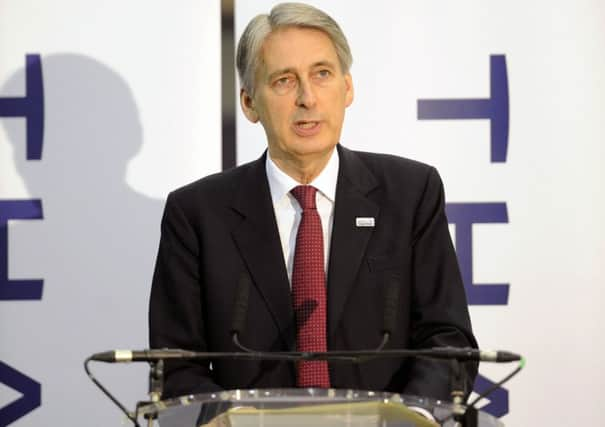Philip Hammond accused of emotional blackmail


Mr Hammond, who was addressing defence workers at the Glasgow components firm Thales yesterday, was asked about the “potential implications” for the plant in the event of Yes vote.
He said: “The creation of a border between this facility and its largest customer will put at jeopardy the future prosperity of this business, the people who work in it and their families and dependents.
Advertisement
Hide AdAdvertisement
Hide Ad“Clearly, the Ministry of Defence in the UK buys much of its capability from its indigenous industrial base. That’s not for reasons of sentimentality, that’s for reasons of strategic control, for reasons of being able to manage the security of facilities and for reasons of resilience in times of conflict.
“If we were to separate, then the future of the defence industry in Scotland, that depends on MoD orders, will be put at risk.”
He added: “The future of sites such as this would be clearly jeopardised and the assertion by the Nationalists that they would generate – in Scotland’s own defence forces – the orders that would keep our shipyards going, that would sustain plants like this, is simply not credible when you look at the numbers.”
The minister was challenged by Thales worker Daniel McGee who criticised his approach.
He told the Conservative MP: “You said you don’t want to talk about dire consequences of independence, but how do you reconcile that with the implication that our jobs are under threat and that as a consequence we’ll suffer and our families will suffer, which was a nice touch. I feel aggrieved that you’ve come up here and seem to be quite threatening that our jobs will go.”
Mr McGee said later: “It just seems to be that attitude and perception of the No campaign, that negativity. It felt like a direct threat, it felt like strong-arm tactics and blackmail and emotional blackmail, even, when he brings your family into it.”
Asked if he felt it would put him off backing independence, he added: “I think that’s what he [Hammond] would like to think has happened. I’m not so sure people will be swayed that much by threats.”
Last night, Mr Hammond’s “directness” was praised by unions, concerned about the prospects for such a key Scottish industry if Ministry of Defence work dries up after a Yes vote.
Advertisement
Hide AdAdvertisement
Hide AdNationalists said the episode showed the “patronising and unfounded” scaremongering of the No campaign was taking its toll on voters.
First Minister Alex Salmond insisted that an independent Scotland would spend more on defence procurement, with a long-term future for shipbuilding if a Yes vote was secured.
SNP defence spokesman Angus Robertson said a backlash against the No campaign’s approach has been on the cards.
He added: “It is no surprise that workers in the defence industry do not take kindly to Philip Hammond and the No campaign’s patronising and unfounded attempts to whip up a threat to their jobs.
“It is the highly developed skills of the workers in the defence sector that has made these companies so successful and after a Yes vote, an independent Scotland will work closely with our friends and allies on the joint procurement projects which are the norm in the industry.”
The UK government has already made it clear it does not build warships in foreign countries and is unlikely to do so in Scotland after independence. The Ministry of Defence wants to build the new generation of Type 26 destroyers on the Clyde – but a final decision has been postponed until after the referendum.
SEE ALSO